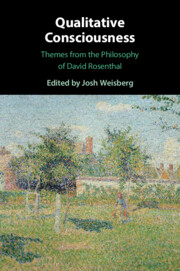
- Publisher:
- Cambridge University Press
- Online publication date:
- October 2022
- Print publication year:
- 2022
- Online ISBN:
- 9781108768085

Qualitative consciousness is conscious experience marked by the presence of sensory qualities, like the experienced painfulness of having a piano dropped on your foot, or the consciousness of seeing the brilliant reds and oranges of a sunset. Over his career, philosopher David Rosenthal has defended an influential theoretical approach to explaining qualitative consciousness. This approach involves the development of two theories – the higher-order thought theory of mental state consciousness and the quality space theory of sensory quality. If the problem of explaining qualitative consciousness is divided into two more manageable pieces, the door opens to a satisfying explanation of what is seen by some to be an intractable explanatory puzzle. This interdisciplinary collection develops, criticizes, and expands upon themes inspired by Rosenthal's work. The result is an exciting collection of new essays by philosophers and scientists, which will be of interest to all those engaged in consciousness studies.
 Loading metrics...
Loading metrics...
* Views captured on Cambridge Core between #date#. This data will be updated every 24 hours.
Usage data cannot currently be displayed.